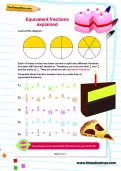Important update from TheSchoolRun
For the past 13 years, TheSchoolRun has been run by a small team of mums working from home, dedicated to providing quality educational resources to primary school parents. Unfortunately, rising supplier costs and falling revenue have made it impossible for us to continue operating, and we’ve had to make the difficult decision to close. The good news: We’ve arranged for another educational provider to take over many of our resources. These will be hosted on a new portal, where the content will be updated and expanded to support your child’s learning.
What this means for subscribers:
- Your subscription is still active, and for now, you can keep using the website as normal — just log in with your usual details to access all our articles and resources*.
- In a few months, all resources will move to the new portal. You’ll continue to have access there until your subscription ends. We’ll send you full details nearer the time.
- As a thank you for your support, we’ll also be sending you 16 primary school eBooks (worth £108.84) to download and keep.
A few changes to be aware of:
- The Learning Journey weekly email has ended, but your child’s plan will still be updated on your dashboard each Monday. Just log in to see the recommended worksheets.
- The 11+ weekly emails have now ended. We sent you all the remaining emails in the series at the end of March — please check your inbox (and spam folder) if you haven’t seen them. You can also follow the full programme here: 11+ Learning Journey.
If you have any questions, please contact us at [email protected]. Thank you for being part of our journey it’s been a privilege to support your family’s learning.
*If you need to reset your password, it will still work as usual. Please check your spam folder if the reset email doesn’t appear in your inbox.
Help your child cope with divorce and separation

As a parent, facing the prospect of divorce or separation from a partner can be a daunting experience, fraught with anxieties about how your child may be affected. While these concerns are perfectly natural, it is important to remember that it’s within your power to help minimise the negative effects for your family.


Start a unique learning programme!
- Weekly programme for each school year
- Worksheets sent direct to your inbox
- Keeps your child's learning on track
Linda Jones author of Divorce and Separation: The Essential Guide, says, “It is easy to start believing it will cause immeasurable damage to your children.” However, she adds, “What matters most is how this undoubtedly traumatic turn of events is handled, how the parents conduct themselves in front of their children, how they relate to each other, what they say about them, and how they work together to make things work.”
Unfortunately a parental split can be a very unsettling time for children involved, and they may experience feelings of anxiety, loneliness, insecurity, anger, and sadness. It is important that you as parents work together in a partnership to help them through this difficult time. Follow these key pieces of advice:
Communication
Help your child to understand your separation or divorce through talking openly with them. Encourage them to ask questions, and answer them appropriately.
Reassurance
Ensure that your child shares their worries and feelings with both of you. That they don’t feel to blame for your split is important in helping them feel secure and comfortable about what is happening.
Keep routines
Making sure your child’s feelings of stability and security stay intact throughout the change in your relationship is important. You can help this by ensuring that their daily routine does not change too much, too quickly.
Spend time together
Make sure you spend plenty of quality time with your child, just enjoying yourselves and relaxing
Be alert
Watch out for any warning signs or changes in your child’s behaviour. It could be a sign they are more affected by the split than they are letting on.
Speak to school
Remember to communicate with your child’s school so that they can help support your child. If you are anxious about your child’s behaviour, do try approaching a counsellor or therapist who can offer expert guidance
Protect your child
Don’t expose them to any arguments or conflict. Make sure these do not happen in the house – even if you think your child is asleep. Although it is good to communicate certain things with your child, do not burden them with too much information or emotionally ‘lean’ on them. Be sensitive to their age.
Set ground rules together
As individual parents you do not want your child to identify one of you as the ‘hero’ who lets them stay up late and eat what they like and the other as the ‘villain’ who tells them what time bedtime is and who insists they eat their greens. Come up with a practical set of rules together.
Other resources:
www.divorceaid.co.uk








